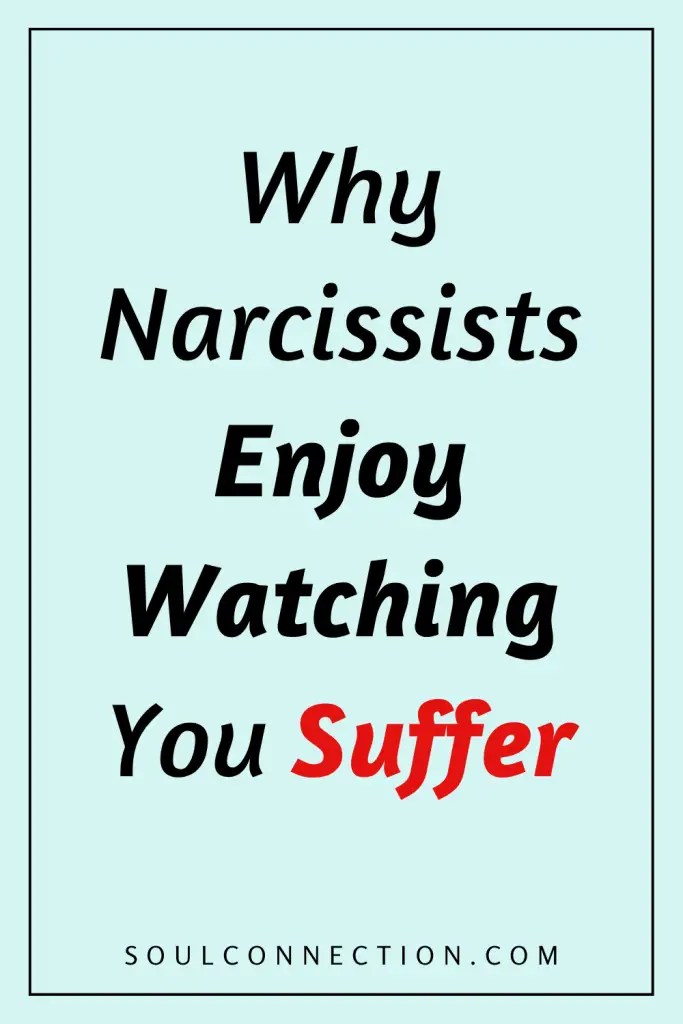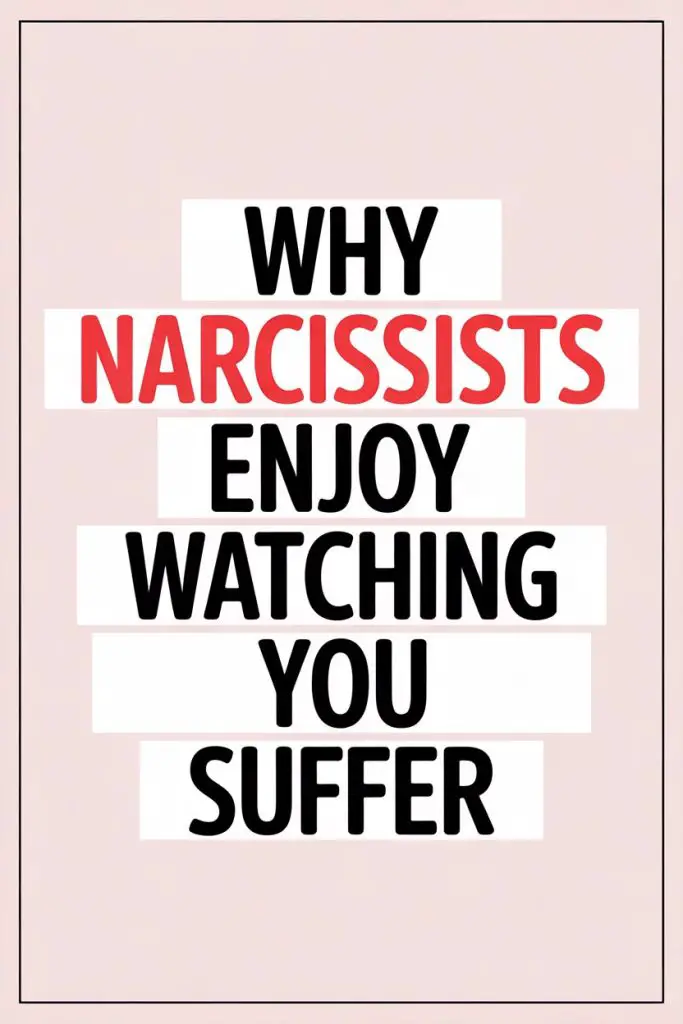Narcissists have a reputation for being difficult, but their fondness for other people’s pain often leaves loved ones reeling. If you’ve ever wondered why it seems to put a spring in their step when you’re down, you’re not alone.
The truth? There’s more at play than just garden-variety selfishness. It’s just as twisted as it looks, and understanding it can help you break free from their toxic grasp.
The Power Play at the Heart of It
Narcissists crave control and dominance like a toddler craves chocolate. Watching you suffer? That’s proof, in their mind, that they’re running the show.
When you’re upset, anxious, or in distress, it reinforces their sense of power. You become easier to manipulate, and your reactions feed their need for significance.
If you’ve experienced a narcissist poking at your insecurities or ramping up the drama just when you’re feeling low, you’ve seen this power trip in action.
It’s not about caring that you’re hurting. It’s about the rush of being the cause—or at least the main character in your misery.
Attention Is Oxygen
Narcissists thrive on attention, even if it’s the negative kind. Your suffering guarantees their position front and center.
When you’re upset, you often turn to the narcissist—seeking answers, comfort, or closure.
Instead of providing support, they might throw out a dismissive “You’re too sensitive,” or sit back to watch the fireworks. Your emotions are the main event.
The more distressed you are, the more energy you pour into the narcissist. It’s emotional fuel for someone who’s always running on empty inside.
Validation Through Contrast
Nothing boosts a fragile ego like comparison. When you’re struggling, the narcissist feels superior by default.
Your pain becomes a measuring stick for their own supposed strength, intelligence, or cool-headedness. “Look at how you fall apart—I’d never let that happen to me,” they might say (if not out loud, definitely in their head).
If you find your suffering downplayed or dismissed, it’s not because they don’t see it. It’s because, in that moment, your weakness is propping up their self-image.
Emotional Sadism in Everyday Clothes
Sadism doesn’t always wear a villain’s cape. For narcissists, it often hides in snarky comments, passive-aggressive digs, or that infuriating smirk when you’re upset.
Some narcissists genuinely enjoy the discomfort of others. It’s not always a grand, movie-villain scheme.
Sometimes, it’s subtle: a sharp word at exactly the wrong moment, a withheld apology, or that “accidental” reminder of your biggest fear.
This is more than emotional clumsiness—it’s a calculated move to keep you off balance.
The Cycle of Idealization and Devaluation
Narcissists love putting people on a pedestal, only to kick it out from under them. Why? Your fall is their entertainment (and reassurance that they’re still on top).
During those early, “honeymoon” days, you felt adored. The shift—often sudden—to criticism and coldness can be a shock.
But your confusion and pain serve a purpose: they remind the narcissist that you’re hooked on their approval.
Every tear, every anxious question about what you did wrong, is a signal that you care. That keeps them at the center of your world, which is exactly where they want to be.
Projecting Their Own Pain
Narcissists are experts at dodging self-awareness. Instead of facing their own insecurities or failures, they offload those feelings onto others.
When you’re in pain, it allows the narcissist to avoid their own. “If you’re suffering, maybe I’m fine,” goes the unconscious logic.
Their internal chaos gets pushed onto you, and your distress becomes their twisted relief. It’s projection at its ugliest.
Keeping You Dependent
Misery makes you easier to manage. If you’re constantly second-guessing yourself or feeling inadequate, you’re less likely to challenge the narcissist’s control.
This isn’t always conscious. Still, the result is the same: you become stuck in a cycle of looking to them for validation—validation they’re never going to give.
Your suffering keeps you focused on them, not on your own needs or boundaries.
It’s like training a dog with unpredictable rewards, except you’re not a pet and this isn’t a trick.
Drama Is Their Playground
Chaos is where narcissists shine. The more upset you are, the more dramatic the relationship becomes—and that’s their favorite environment.
Peace and mutual respect? Boring. But your distress, your arguments, your late-night texts? That’s prime entertainment.
Often, narcissists will provoke you, then act innocent when you react. This “see how irrational you are?” routine lets them play the victim and keep you on the defensive.
The Insecurity Beneath the Surface
Strangely enough, all this cruelty is often rooted in insecurity. If you’re doing well—happy, confident, at peace—it’s threatening.
You might realize you deserve better. You might leave.
Turning up the heat on your suffering distracts you from your own growth and independence. It’s a way of keeping you small, and their ego big.
No matter how tough they act, narcissists are terrified of losing control. Your distress is the reassurance they need that things are still going their way.
Practical Ways to Flip the Script
All this may sound grim, but there are real, concrete steps you can take—starting tonight—to protect yourself and stop feeding the narcissist’s enjoyment.
Refuse to react on cue. When you sense the drama machine revving up, pause. Take a breath. Walk away if you need to. Your calm is their kryptonite.
Set boundaries like you mean it. Decide what’s acceptable and stick to it, even if it’s met with tantrums or guilt trips. You’re not responsible for managing their emotions.
Limit emotional disclosures. Sharing your deepest pain with a narcissist often backfires. Save your vulnerable moments for those who can handle them with care.
Document the patterns. Not for the narcissist’s benefit, but for your own clarity. Seeing the cycle in black and white can make it easier to detach.
Reach out to your support network. Whether it’s mates, family, or a therapist, don’t let the narcissist isolate you. Your people know who you are, and they’ll help remind you too.
Focus on your own healing. Their happiness is not your job. Your suffering is not their business. Take up a hobby, get outside, laugh with friends—the more joy you reclaim, the less power they have.
Reclaiming Your Peace
Narcissists might get a kick out of your misery, but you have more say than you think. Their pleasure in your pain is a reflection of their own emptiness, not your worth.
Refusing to play the part they’ve written for you is the bravest thing you can do. Take back your peace, one boundary at a time.
And next time they smirk at your discomfort? Remember: nothing confuses a narcissist like someone who’s stopped suffering for their entertainment.


